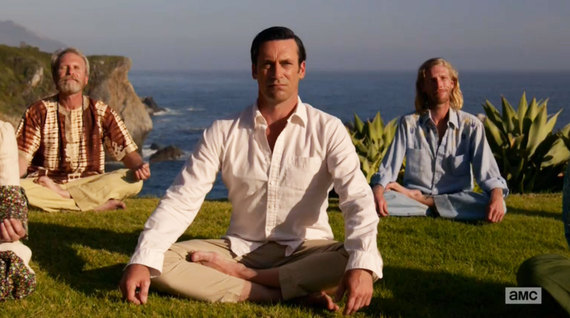Of the controversies surrounding the Mad Men finale (did Don Draper write the Coke ad? has he gotten away with his bad behavior?), the most significant one is bit more subtle than the others:
Is the ending woo-woo?
After our culture's eight years of series-inspired infatuation with the booze 'n' broads 'n' Brooks Brothers ethos of the early 60s, does it all end not with a stylish bang but a hippy-dippy whimper, namely Om?
Well. First of all, it's clear that the ending makes sense historically. Every age, with all its excesses, brings about the next. The acquisitiveness, casual sexism, and bourbon blur of the Rat Pack era compelled the antimaterialism, feminism, and psychedelic/spiritual experimentation that followed. Every great drama poses an urgent, underlying question. Hamlet asks, Can a righteously motivated individual effectively go mano a mano with society's corruption? Mad Men asks, Where does that lifestyle and those attitudes we've been wallowing in for the last seven seasons lead? Historically, the answer that the show's creators came up with is accurate.
It's also historically accurate that most of the people chanting Om on an oceanside bluff in northern California in 1970 would have shaggy hair and hippyish outfits. For decades that confluence of trends allowed many people to write off any kind of meditative exploration as woo-woo hippy stuff. No longer. Now practically everyone has at least a cousin or a neighbor who has taken up meditation, if not to attain enlightenment then to lower his blood pressure. Now the Seattle Seahawks, Aetna Insurance, and the US Marine Corps, to name but a few decidedly non-hippyish outfits, have incorporated meditation into their programs. In 2015, Don Draper wouldn't have to run off to a California commune to meditate: his company would offer in-house training.
True, even in our meditation-friendly decade, the specific technique that Don is shown using, chanting Om, is still widely -- but erroneously -- regarded as woo-woo. Anything that's outwardly foreign-looking is temptingly easy to make fun of. Probably most of the meditation in our society these days is done on couches, on subways, and in office cubicles by people who, as far as anyone can tell from the outside, may just be catching a quick nap. Once they cross their legs or intone a mantra, they've given us a handle, something to misunderstand and, if we're so inclined, to ridicule.
Well, lots of good things can look ridiculous -- or worse -- from the outside if you haven't experienced them from the inside. Mealtime scenes on TV and films are usually edited to minimize shots (especially close-ups) of people actually chewing and swallowing. Eating is yummy to do but gross to watch. Watching other people have sex, when it hasn't been prettied up by a lot of carefully chosen lighting tricks and camera angles, can be pretty comical. In the same way, yoga poses and mantras can seem misleadingly funny (and woo-woo, if you think in such categories) if you haven't experienced them from the inside.
So, even if it's only so you can have a valid opinion about the series finale that has become one of this month's favorite water-cooler topics, here's my suggestion:
Give it a try.
But make sure you're doing it right. One of the reasons why mantras are not woo-woo is that they're not merely arbitrary expressions of some kind of mystical faith or put-on attitude. They're straightforward psychoacoustic technology. That is, specific sounds are used for their specific resonance within the human nervous system and the way that resonance conduces to a settling down into a meditative state of silent awakeness.
Westerners chanting Om commonly pronounce its second sound like our letter m, which causes it to terminate as a mere buzzing of the lips. (Try it and you'll see what I mean.) The correct pronunciation is what's called a nasalization, like the n in the French bon or the subtle second h in the English huh? Experiment a little, and you'll feel how that sound makes your whole skull vibrate from the inside. Then prolong the sound, only bringing the lips together very lightly at the end. Then close your eyes and keep doing it. See what happens. Spend five minutes doing this, and I'll bet money you'll never make fun of it again.
See what happens. That's called scientific method. It's what the Buddha taught when he said Ehi passiko, "Come and see" -- not "Come and believe" or "Come and cop an attitude." It's not woo-woo. It's not blind superstition. Casually labeling and writing off things we've never experienced? That's blind superstition.

